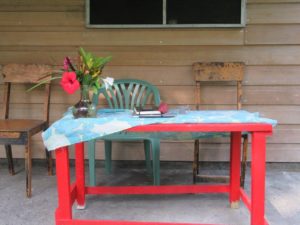 In many languages of the world, emotions and medical conditions are not attributed to an individual, but to a certain body part. For example, instead of saying “I am sad”, you may have to say something along the lines of “my heart is heavy” in many languages. In these cases, the meaning of “being sad” does not reside in a single word. “Heart” alone does not express sadness, and neither does “heavy”. Only the combination of the two can express this concept. The question is then how such languages form expressions that refer to an abstract emotion such as “sadness” . And the answer is that there are different strategies. One strategy is to say something like “the heaviness of the heart”. The Oceanic language Daakaka, however, uses a different strategy. Here, an emotion concept is expressed by a structure such as “the heavy heart”. This paper investigates these differences and their implications. Get it here or ask me for the preprint.
In many languages of the world, emotions and medical conditions are not attributed to an individual, but to a certain body part. For example, instead of saying “I am sad”, you may have to say something along the lines of “my heart is heavy” in many languages. In these cases, the meaning of “being sad” does not reside in a single word. “Heart” alone does not express sadness, and neither does “heavy”. Only the combination of the two can express this concept. The question is then how such languages form expressions that refer to an abstract emotion such as “sadness” . And the answer is that there are different strategies. One strategy is to say something like “the heaviness of the heart”. The Oceanic language Daakaka, however, uses a different strategy. Here, an emotion concept is expressed by a structure such as “the heavy heart”. This paper investigates these differences and their implications. Get it here or ask me for the preprint.
Tag: Vanuatu
Three deaths and one marriage…
 …made for a challenging field trip to Ambrym this year. Still, I was lucky enough to get enough speakers both of Daakaka and Dalkalaen to collect the data we need for MelaTAMP – thanks to the people of Emyotungan and Tio Bang in Port Vila. Now I’m excited to start with the analysis. Stay tuned.
…made for a challenging field trip to Ambrym this year. Still, I was lucky enough to get enough speakers both of Daakaka and Dalkalaen to collect the data we need for MelaTAMP – thanks to the people of Emyotungan and Tio Bang in Port Vila. Now I’m excited to start with the analysis. Stay tuned.
MelaTAMP Workshop in Port Vila
We held a small workshop at the University of the South Pacific yesterday, on Emalus Campus in Port Vila, Vanuatu. The purpose was to introduce and discuss the storyboards we have developed as part of the MelaTAMP project.
We thank Robert Early and Meriani Situ for their organisation and local support, and we’re happy that our audience extended far beyond our few project members and collaborators.
